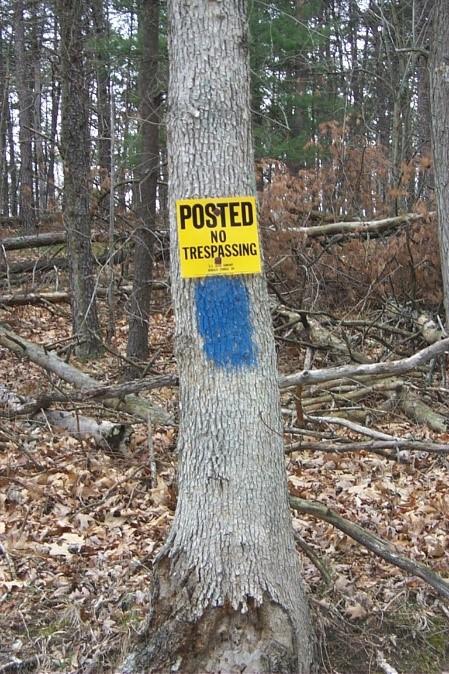With hunting season around the corner, many landowners wish to control who will have access to their property. The overabundant deer population in Maryland makes it important for private landowners to encourage the harvesting of deer, especially doe deer. While you may not hunt, allowing other hunters to use your property is highly recommended. Maryland hunting regulations require hunters have written permission to hunt on private property they do not own. Posting property in a conspicuous manner makes it illegal for any recreationalist to enter the property without the owner’s permission. The challenge is how to let others know your property boundaries and that there is no trespassing without permission. Then you can decide whether or not to provide permission.

This article is not intended to be a substitute for counsel from a lawyer or insurance agent regarding a particular situation. Individuals who want or need this counsel are urged to seek a knowledgeable and competent source.
Posting conventional no trespassing signs can be an expensive and time-consuming project. Vandalism of signs by trespassers is common with the belief that if no sign exists then access is allowed. Trespassers not in possession of the written permission of the landowner can be cited if challenged by the Maryland DNR Natural Resource Police (NRP).
Blue Paint Law
A Maryland law passed in 1989 (Natural Resource Article 5-209) makes the chore of posting much easier and cheaper for landowners by allowing the use of vertical strips of oil-based blue paint as an alternative to signs. The law states that paint marks must be at least 2 inches wide, 8 inches long, and centered from 3 to 6 feet from the ground or water surface. Although the distance between marks is not stated, mark them close enough that a person standing in front of one mark would be able to see the paint marks to their right and left. Every few years the paint marks can be freshened up but maintenance is far easier than dealing with signs.
(Note that similar laws exist in other states, and the color of the paint varies. For example, Pennsylvania and West Virginia landowners can use purple paint to mark their boundaries. Virginia landowners can use purple or aluminum-colored paint for the same purposes. Be sure to check local regulations if traveling out of state to hunt.)
Prosecuting Trespass
Prosecuting for trespass is not without its challenges. Maryland law make it clear that it is unlawful to trespass on properly posted private lands and that, whether posted or not, persons must leave the property immediately upon request by the landowner or the landowner’s agent. The important point is that to successfully prosecute for trespass, it is best to have the Maryland NRP issue the citation. To do this they must witness the trespass firsthand, which can be difficult. In some cases, it is best to wait and call the NRP when the trespasser is unaware they are being watched and will be on the property for a time.
If a citation is issued by an officer, the person is not taken away in handcuffs. These offenses are misdemeanors and if convicted, the trespasser is subject to imprisonment not exceeding 90 days or a fine not exceeding $500 or both. In reality, jail time is rarely given unless it is for serious or repeat offenses. Trespass is a crime against the landowner; therefore, you will need to appear in court with the officer to verify the person was trespassing. Experience has shown that in cases where the landowner does not appear in court to verify the trespass, the case will most certainly be dismissed.
Landowners may be unwilling to appear in court due to fear of retribution, property damage, or other reasons. Therefore, before calling the police to confront trespassers, be prepared to appear in court if you want a successful prosecution.
If you are not able to control trespass on your property, it is recommended to provide permission to a group of hunters or a hunt club. These groups tend to take stewardship of the property seriously and value having private property to hunt or recreate. Working with the group, they will post the property if you wish and make it known to others that they have permission to hunt and trespassers do not. For absentee landowners, this is a good option. Working with a reputable group of local hunters means absentee landowners can have some assurance of who will be on the property.
There are many nuances to learn about trespass and property rights. The University of Maryland Extension publication Landowner Liability and Recreation Access (EB357) provides the information you need. Pages 11 through 16 provide specific details on trespass and property rights, rights of landowners versus recreationalists, prosecuting trespass, and frequently asked questions involving trespass prosecution. Other sections of the publication discuss landowner liability and recreational access, timber trespass, developing a hunting lease enterprise, sample leases, and more. The publication is available online at https://extension.umd.edu/resource/landowner-liability-and-recreational-access-eb-357.